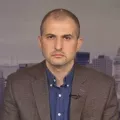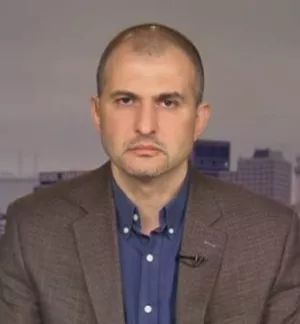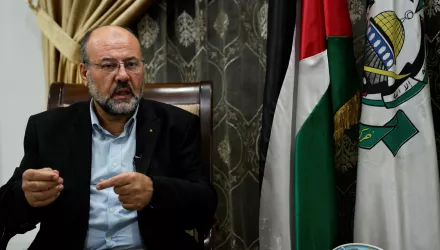A powerful bomb went off on 24 January at Moscow’s busiest airport, killing 35 and injuring some 180 others. As of 26 January, no one had claimed responsibility for the attack at the Domodedovo airport, but investigators suspect that North Caucasus-based terrorist networks, which have carried out the majority of terrorist attacks in Russia in the past years and which often use suicide bombers, were responsible.
The head of the suspected suicide bomber recovered from the scene appears to look like that of a native of Russia’s North Caucasus or an Arab, according to the investigators. And Deputy Chairman of the State Duma’s Security Committee, Magomed Vakhaev, told Kommersant daily on 24 January that a Dagestan-based faction of the North Caucasus terrorist network was likely behind the attack as revenge for the efforts of Russia’s security services, which have been actively dismantling this faction since the first weeks of January, killing one of its leaders. Sources in Russia’s law-enforcement community, however, believe the culprits could have been from the so-called Nogai battalion, a terrorist group comprised of ethnic Nogais and based in Russia’s Stravropol region, which borders North Caucasus.
Investigators say the bomb, which had a yield of up to 10 kilograms, was set off by a man who may have been accompanied by a woman with another accomplice left in the privately-managed airport’s parking lot. It was from this parking lot that the suicide bomber accessed the building via an elevator and walked to the international arrivals zone before setting of his explosives.
ANALYSIS: “We are going to pursue terrorists everywhere. If they are in the airport, we will pursue them in the airport. And if we, excuse me please, capture them in the toilet, then we will waste them in the outhouse too, eventually. That is all. The question is dealt with once and for all,” Russian Prime Minister Vladimir Putin told Russian television on 24 September 1999.
Putin went on to become the Russian president, while his vow to “waste terrorists in the outhouse” became the unofficial slogan behind his method of taming terrorism in Russia. More than a decade later, however, Russia continues to suffer from the deadly menace of indigenous terrorism, of which the 24 January suicide bombing at Domodedovo has become the latest manifestation.
Dmitry Medvedev - whom Putin handpicked as his successor and whom he helped get elected to the Kremlin in 2008 - seized on this information to lambast the management of Domodedovo for “either absence of control” or “partial control of movements” in the airport. Speaking at the annual meeting of the Federal Security Service’s (FSB) top brass on 25 January, the Russian president said there was only “partial control of movements, which in practice didn’t apply to those who were meeting passengers” at the airport. He called for the ouster of the airport’s management and for the introduction of “a more rigid system of checks, total control” of airport security in Russia. Medvedev also demanded the resignations of officials responsible for transport security at the FSB, which is Russia’s lead counter-terrorism agency, and the Interior Ministry (MVD). And he called on these agencies to find the organizers of the attack. “The nests of these bandits will be liquidated," he vowed.
The Big Picture: Medvedev’s tough talk may convince the general public that he is capable of rising to security challenges, which is important in the pre-election year, as it was important for Putin in 1999. But these statements may also be a sign that the president has not really grasped the bigger picture clearly.
A substantial toughening of the security regime at airports will definitely make it more difficult for terrorists to strike such facilities, but it may also considerably slow passenger traffic. More importantly, terrorists tend to switch to softer targets after such measures are implemented and, unfortunately, they have a long list of public and private facilities with large concentrations of people from which to choose. Or, they can detonate bombs at the first barrier of security as they did at the Krylya festival in Moscow in 2003.
Also, while within his rights to demand the resignation of MDV and FSB officials, Medvedev is on rather shaky ground when he faults the managers of a privately-managed airport for security lapses in a public access zone beyond security and customs barriers where law-enforcers should be ensuring security. After all, counter-terrorism is the job of these law-enforcement and security agencies, which at the very least require the airport management to install additional control barriers and post patrolmen at entrances.
Authorities were tipped off one week prior that “something is being prepared” and may take place near Domodedovo’s customs control zone, but police patrolmen assigned to the airport continued to focus on shaking down foreigners arriving from Central Asia, an employee of the airport’s private security service told Lifenews.ru news portal on 24 January.
If that allegation is true, then the question arises whether all the measures that the government has taken and will take to fight terrorism will work as long as corruption persists. The answer is, of course, no.
BOTTOM LINE: The authorities need to root out corruption in law-enforcement bodies, motivating everyone from patrolmen to detectives to prevent crime rather than seeking illicit ways of earning extra money on the side. The same goes for those responsible for airport security, especially given the fact that two suicide bombers, pretending to be in a rush, bribed their way onto planes at the same airport in 2004 to kill 90 people.
Authorities also need to reverse reformation of the Interior Ministry's directorate that used to deal with terrorism and organized crime, which was reformed in 2008 to focus on 'extremism' and now has to spend a significant amount of time working on the radical political opposition.
Hopefully, the attack will also motivate federal authorities to amend laws and practices to achieve that goal rather than introduce another round of what Russians call a “tightening of the screws “ like that following the 2002 Dubrovka and the 2004 Beslan hostage-taking tragedies, which the Kremlin used to curb media freedom and to cancel the popular election of governors, respectively.
Russian authorities have made significant progress in dismantling North Caucasus-based terrorist networks, with most of their veteran leaders either killed or captured. However, clearly more needs to be done to keep them on the run. If indeed organized by the networks, the 24 January attack demonstrates that the recent schism in the leadership of these networks has had little impact on their overall capabilities, but may even be prompting splinter groups to up the ante in an effort to outbid each other, as I predicted in a December 2010 comment.
Rather than continue pursuing a reactive and selective approach to terrorist attacks, Russia also needs to implement systemic measures to motivate its law-enforcers to focus on preventive measures and to address root causes of terrorism. Root causes and contributing factors behind this menace include the growing popularity of the militant Salafiya ideology in the North Caucasus, abuses of the local population at hands of law-enforcers, poverty, joblessness, lack of educational and lack of upward social mobility for the vulnerable youth.
Until this is done, terrorist groups will continue to enjoy a steady stream of new recruits. As a member of State Duma’s Security Committee and retired FSB Colonel Gennady Gudkov told Kommersant: Terrorists used to spend months trying to find and train suicide bombers, “now there is a line of suicide bombers formed in the North Caucasus waiting for their turn to blow themselves up.”
Saradzhyan, Simon. “Suicide Bombing at Moscow Airport Illustrates Russia’s Misguided Security Strategy.” Global Intelligence Report, January 27, 2011



